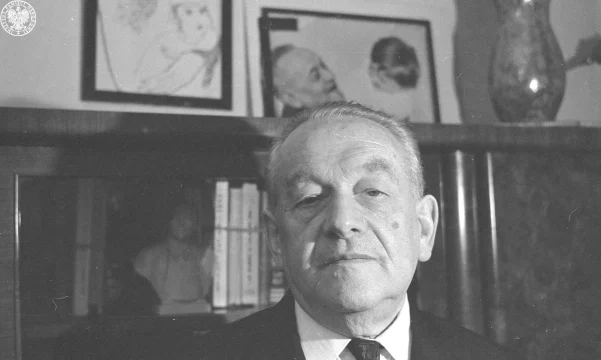


Tomasz Wolski: The Big Chief

Wolski pitched “The Big Chief” in Sarajevo last August. During a workshop at ZagrebDox he told me that the film was to have its premiere at Visions du Réel in Nyon. It had, the other day. He sent me a link and below is my review. The film will also be shown at The Millennium Docs Against Gravity Film Festival in Warsaw in May and at Krakow Film Festival in June. Of course. And many other festivals will follow. Wolski is a master in his work with archives, I have written about three of his films on this site, go to “search” if you like.
I have seen the film twice. After the first time I wanted to go back for two reasons: The story about Leopold Trepper is a fascinating war and post-war history with plenty of details to study AND the way it is told is a superb piece of Cinema. Totally built on archive there is never a dull moment, it’s entertaining because Wolski dares to play with his material and the material he has with Trepper is extraordinary. A main source is an interview made by famous French journalist Pierre Elkabbach. The journalist came to Poland in 1972 but was not – in the beginning – given access to Trepper. There are some hilarious scenes, where Elkabbach asks the authorities if he may go to give Trepper a birthday cake!
It became terrible for us from 1968, Trepper says. It was the time, where Gomulka was head of the communist party in Poland and where the official policy was openly anti-semitic. “They”, meaning the Jews in the country, can leave if they want. But not Trepper who was put in house arrest.
Trepper worked for Moscow. He organized a network of agents, who collected intelligence to be delivered to USSR. As a true believer in communism – as was his wife Luba – he set up the so-called Red Orchestra that had its office in Paris with agents around Europe. It was in 1937. In the beginning of the war he was arrested by the Germans and became a double agent. But I never betrayed France, he said in the many post-war interviews and in his book “The Great Game”. I fought against nazism.
Another strong character in the film is Gilles Perrault, who wrote “The Red Orchestra” in 1967. He tells with passion about Trepper, who finally, after having started a hunger strike, got permission to leave Poland to join his family.
It’s complicated to remember it all after two screenings but of course, for a Dane, it is very interesting to see footage of Trepper and his wife in Copenhagen, where his son Michael Brojde lived. In 1972 Michael started a hunger strike to get his father out of Poland. (He stopped the strike after 171 hours being urged to do so by his father and the Chief Rabbi of Denmark Bent Melchior – this is not in the film, I googled it and I also saw that Brojde wrote a book about his childhood in Stalin’s Soviet Union, 1936-54). After the war Trepper went to Moscow, was arrested and sent to prison for 10 years.
Trepper was a family man. He talks warmly about his wife and how she kept the family (three sons, Michael, Peter and Edward) together, when he was imprisoned. Why were you in jail, he is asked in the film. I was considered a traitor, he says.
Perrault shakes his head, when he talks about Trepper wanting to go to Israel – he was never a zionist, he says. Trepper – in the Copenhagen footage – on the contrary says about going to Israel that he wants to be close to his children. One of them was married to a doctor, good to have a doctor close to you, he says and lights a cigar, as a doctor had said that cigars are not so bad as cigarettes… during the many interviews you see Trepper smoking cigarettes all the time.
Playful, elegant in editing, jumping in time, amazing storytelling, many many close-ups of the master spy, humor, for film and history lovers and for all of us, who like a good spy story! And Wolski cares about his audience including in the film wonderful footage from Poland in the 60’es, horrible images from the war – Jews being hanged in public – Stalingrad, and lovely glimpses from Paris and Moscow… I could go on. In other words: No objections!